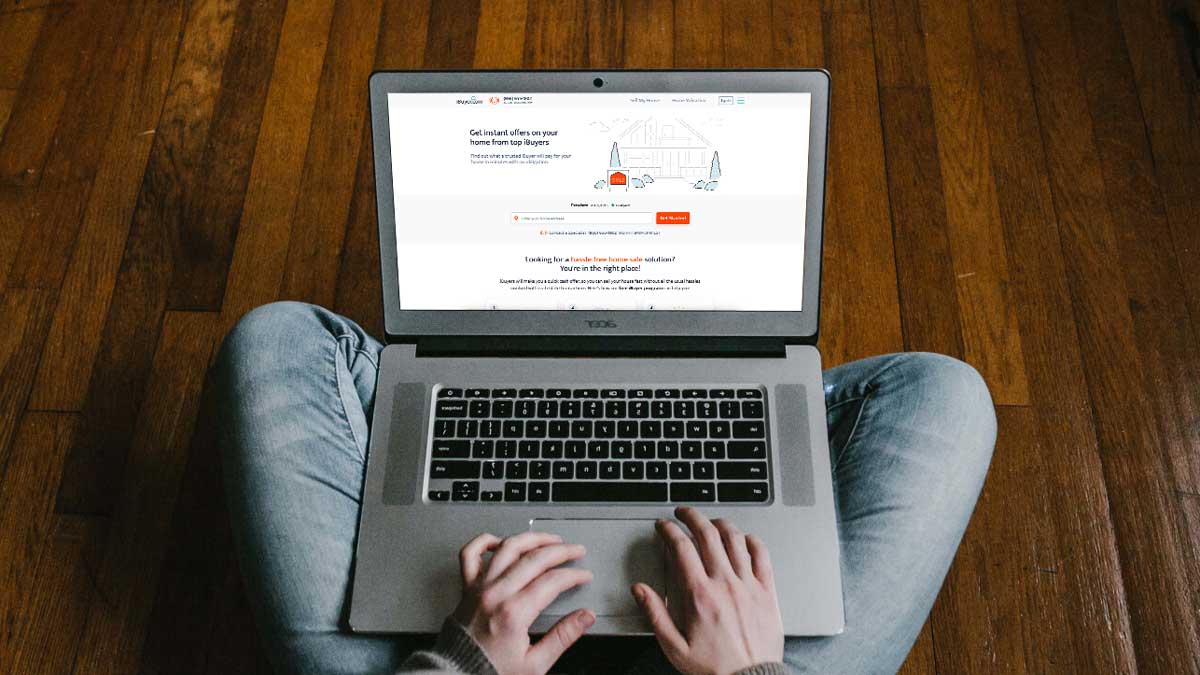2024 Guide: iBuying Explained - What Is an iBuyer?

In the ever-evolving real estate landscape, a new player has emerged to simplify home selling: the iBuyer.
This innovative concept offers homeowners a swift and streamlined alternative to traditional property-selling methods.
Today, we're covering everything you need to know about iBuying. Whether you're considering selling your home or just curious about this modern approach, you'll learn about the workings, benefits, and considerations of iBuying in today's market.
Keep reading to find out more! Let's first take a look at some of the biggest iBuying companies.
What Are the Biggest iBuying Companies?
The biggest iBuying companies include Opendoor, Offerpad, Orchard, and Homeward. While there are many other options, these are some of the most influential.
Opendoor
Opendoor is a company that has changed how people sell their homes. It started in 2014. The idea behind Opendoor is simple.
They use technology to make selling a house easy and fast. When you sell your home to Opendoor, you don't need to list it or show it to buyers.
Instead, you go to their website and give details about your home. Opendoor then gives you an offer to buy your house.
This offer is based on market data and information about your home.
The process is much faster than traditional selling. If you accept Opendoor's offer, you can choose when to close the deal. This can be in just a few days.
This is much quicker than the usual way of selling a home, which can take months. Opendoor makes money by charging a service fee.
This fee is usually higher than what real estate agents charge. But, many people find it worth it for the speed and ease.
Opendoor does a check on your home before finalizing everything. They might ask for repairs. If they do, they can do the repairs themselves and reduce the cost from your selling price.
This can be easier than doing repairs yourself.
Opendoor is a good choice for people who need to sell quickly. It's also helpful for those who don't want the stress of traditional selling.
But it's important to compare their offer with what you might get in a normal sale. Sometimes, you might get more money selling the usual way. Opendoor's service is about convenience and speed, not always getting the highest price.
Offerpad
Offerpad is another company that's changing how we sell houses. It started in 2015, one year after Opendoor. Offerpad works a lot like Opendoor, but it has its own way of doing things.
When you want to sell your house to Offerpad, you start by going to their website. Here, you fill in details about your home.
Offerpad then uses this information to make an offer on your house. They look at things like where your house is and its condition. The offer is based on data and their real estate expertise.
The biggest benefit of Offerpad is how fast everything happens. If you agree to their offer, you can pick a closing date. This can be as quick as a few days or longer if you need more time.
Offerpad charges a service fee, like Opendoor. This fee can be more than what you'd pay a real estate agent. But many people think it's worth it.
The reason is the speed and the hassle-free experience. Before the deal is done, Offerpad will check your home.
They might find things that need fixing. If they do, they can fix them or take the cost off the price they pay you. This can be easier than fixing things yourself.
Like Opendoor, Offerpad is more about ease and speed than getting the highest price.
Orchard
Orchard is another key player in the iBuying market, offering a unique approach to selling and buying homes.
At its core, Orchard's service is about helping people sell their homes easily. But, it has a special feature. It helps people who are selling their home and buying a new one at the same time.
When you choose Orchard, you start by telling them about your current home on their website. Orchard then gives you an offer to buy your house. This offer is based on a detailed market analysis and the condition of your home.
The big advantage of Orchard is how it handles the transition between homes. If you're buying a new home, Orchard lets you move into your new house before your old one is sold.
This is a big help because it means you don't have to worry about timing everything perfectly. You can move to your new home, and then Orchard will take care of selling your old one.
Orchard charges a fee for their services. This fee is similar to what you would pay a traditional real estate agent. The fee covers both selling your old home and buying the new one.
This can simplify things because you're dealing with one company for everything.
Orchard also inspects your home. If they find things that need to be fixed, they can handle the repairs. The cost is usually taken out of the final selling price.
But, like with other iBuyers, it's important to think about the price. Sometimes, you could get more money by selling your home the traditional way.
Homeward
Homeward is a company that focuses on helping homeowners buy their next home before selling their current one.
This method is especially helpful for people who are looking to move but are worried about the timing and financial aspects of buying and selling at the same time.
When you use Homeward, the process starts with their website. Here, you provide details about the home you want to buy. Homeward then helps you make a cash offer on that new home.
This is a big advantage because cash offers are often more attractive to sellers. It can increase your chances of getting the home you want.
But what about your current home? Homeward takes care of that, too. They give you an offer to buy your current home.
This offer is based on a careful look at your home's value in the current market.
Once your new home purchase is secured, Homeward works on selling your old home.
One of the benefits of Homeward is that they let you move into your new home before your old one is sold. This takes away the stress of having to match up the selling and buying dates perfectly.
For their services, Homeward charges a fee. This fee is competitive with traditional real estate services. It includes both the buying of your new home and the selling of your old one.
This can simplify things because you are dealing with just one company for the entire process.
Homeward also conducts an evaluation of your current home. If repairs are needed, they can manage them for you. The cost for these repairs is usually subtracted from the selling price of your home.
Homeward is an excellent option for those who need to buy a new home and sell an old one at the same time.
However, as with the other iBuying services we've looked at, it's important to consider whether the convenience outweighs the potential of getting a higher price through traditional selling methods.
Did you know? iBuyer.com can help you find the best iBuyer for your home, without having to submit your address on all sites and getting multiple quotes.
What Is An iBuyer, Actually?
An iBuyer is a company that uses technology to buy and sell homes quickly.
The "i" in iBuyer stands for "instant," which is key to understanding what they do. These companies provide a fast way to sell your home without the usual steps like listing, staging, and waiting for a buyer.
Here's how it works. First, you contact an iBuyer and give them information about your home. This usually happens online. You'll answer questions about your home's size, age, condition, and location.
The iBuyer then uses special computer programs to look at this information. They compare your home to others in the area. This helps them decide how much your home is worth.
Once they have all the details, the iBuyer makes you an offer to buy your home. This offer comes quickly, often within a day or two.
If you accept the offer, you can choose a closing date. This date can be very soon, sometimes in just a few days. This speed is a big difference from traditional selling, where the closing process can take weeks or months.
iBuyers make money by charging a service fee. This fee is for the convenience and speed they offer.
It's often more than what you'd pay in realtor fees in a traditional sale. After buying a home, the iBuyer might make repairs or improvements. Then, they sell the home for a profit.
iBuyers are not like real estate agents. Agents help you find a buyer for your home.
iBuyers are the buyers. They use technology to make the process fast and easy.
This is great for people who need to sell quickly. It's also good for those who don't want the stress and work of a traditional sale.
How Did iBuying Begin?
Before iBuying, selling a home was often a long and stressful process.
It involved listing the home, waiting for buyers, dealing with showings, and negotiating offers. This traditional method could take months. It also left room for a lot of uncertainty and inconvenience for sellers.
The real estate market was ripe for change. Technology was advancing rapidly in other areas. People were getting used to the convenience and speed of online services in many aspects of their lives.
This set the stage for iBuying.
The first iBuying companies started around the mid-2010s. Companies like Opendoor and Offerpad were among the pioneers. They saw an opportunity to use technology to make real estate transactions faster and simpler.
These companies developed systems that could quickly analyze a home's value based on various data points. This data included the home's location, size, condition, and market trends.
Using this technology, iBuyers were able to make instant offers on homes. This was a game-changer. Sellers now had the option to bypass the traditional selling process.
They could get a fair offer quickly without the usual hassles of selling a home. For many, this meant avoiding months of uncertainty and inconvenience.
iBuying also introduced a new level of transparency and simplicity into the real estate market. Sellers could understand the offer process better.
They had more control over the timing of their sale. This was especially appealing in a world where speed and convenience were becoming more important.
How Does iBuying Work?
iBuying is a process that turns the traditional home-selling method into a faster, more convenient experience. It's a system mostly done online, which is a big part of its appeal. So let's get into iBuying, explained.
When you want to sell your home to an iBuyer, the first step is to visit their website. Here, you provide details about your home.
This includes things like its size, age, condition, and location. The iBuyer uses this information to assess your home.
They have special computer programs that compare your home to others in the area. This helps them understand what your home is worth.
After analyzing your home, the iBuyer gives you an offer. This offer is usually made quickly, sometimes within a day or two.
If you accept the offer, you can choose when to close the sale. This can be done in a few days, much faster than traditional methods.
One key part of iBuying is the service fee. This fee is for the convenience and speed that iBuyers offer. It's often higher than traditional real estate agent fees.
After buying your home, the iBuyer might make repairs or improvements. Then, they sell the home, usually aiming to make a profit.
iBuying is different from working with a real estate agent. Agents help you find a buyer, but iBuyers are the buyers. They use technology to make the process efficient and user-friendly.
This method is great for people who need to sell quickly. It's also good for those who prefer not to deal with the stress of a traditional sale.
Trade-in iBuyers (Orchard and Homeward)
Trade-in iBuyers like Orchard and Homeward offer a unique twist in the iBuying world. They focus on people who are selling their current home and buying a new one at the same time.
This situation can be tricky with traditional methods. But trade-in iBuyers make it smoother.
Here's how it works. First, you tell the trade-in iBuyer about the new home you want to buy. They help you make a cash offer on this home.
Cash offers are often more attractive to sellers, so this can give you an edge in a competitive market.
Once your offer on the new home is accepted, the iBuyer then works on selling your current home. They give you an offer based on its market value.
This offer is similar to what other iBuyers would provide. The difference with trade-in iBuyers is they let you move into your new home before selling your old one.
This is a big help. It means you don't have to line up the selling and buying dates perfectly.
The fees for trade-in iBuying services are often similar to traditional real estate fees. These fees cover both selling your old home and buying the new one.
This can be simpler because you're dealing with one company for everything.
Trade-in iBuyers also handle inspections and any needed repairs on your old home. They often take the cost of these repairs out of the final selling price. This is easier than doing the repairs yourself.
Trade-in iBuying is great for people moving from one home to another. It reduces the stress of matching up selling and buying dates.
It also helps with the financial side of buying a new home before selling your old one.
However, like other iBuying methods, trade-in iBuyers might offer less for your home than you could get in a traditional sale.
What Are the Costs of Working With an iBuyer?
Working with an iBuyer comes with certain costs that are important to understand. These costs are part of what you pay for the convenience and speed of the iBuying service.
The most noticeable cost is the service fee. This fee is what the iBuyer charges for their service. It's usually a percentage of the sale price of your home.
The exact amount can vary between different iBuyers, but it's often higher than the fees charged by traditional real estate agents.
This fee covers the iBuyer's work in assessing, buying, and later selling your home. It's the price you pay for a quick and hassle-free sale.
Another cost to consider is the offer price for your home. iBuyers often make offers that are fair market value, but these offers might be lower than what you could get in a traditional sale.
This is because iBuyers need to make a profit when they resell the home. They also consider the costs of any repairs or improvements they'll need to make before selling.
Repairs and improvements are another area where costs can come in. After an iBuyer assesses your home, they may deduct the cost of necessary repairs from their offer.
This is different from traditional selling, where you might do repairs yourself to increase the home's value. With iBuyers, they handle the repairs but deduct the costs from your payout.
It's also important to remember closing costs. With iBuyers, as with traditional sales, these costs include transfer taxes, title insurance, and escrow fees.
While these costs are similar in both iBuying and traditional selling, they're still a part of the total cost you'll need to consider.
With iBuyer.com there are no fees at all, no matter with which partner you’ll sell. Submit your address and get a no-obligation offer today.
What Are the Fees of an iBuyer?
When you sell your home to an iBuyer, one of the main costs you'll encounter is the iBuyer fee. This fee is a big part of how iBuyers make their business work.
Understanding these fees is crucial when deciding if an iBuyer is right for you.
The iBuyer fee is often a percentage of the selling price of your home. This percentage varies between iBuyers. On average, it can range from around 5% to 8% or more.
This might seem similar to traditional real estate agent commissions. But note that iBuyer fees can sometimes be higher.
Why is there a fee? The iBuyer fee covers the convenience and speed of their service.
This fee is what you pay for the ability to sell your home quickly and without the usual steps like staging, listing, and showing your home to potential buyers. The fee also covers the risk the iBuyer takes in buying your home outright.
They need to make a profit when they resell the home.
It's also important to know that the iBuyer fee isn't the only cost. There might be other fees or deductions. For example, if the iBuyer finds that your home needs repairs, they might deduct the estimated repair costs from their offer.
Another point to consider is the offer price itself. iBuyers aim to make offers that are fair market value. However, these offers might be lower than what you could get in a traditional sale.
This is because iBuyers factor in their need to resell the home for a profit.
Finally, there are closing costs, the fees you pay at the end of the selling process.
These costs are similar whether you're selling to an iBuyer or through traditional methods.
iBuyer Pros and Cons
There are, of course, many pros and cons of iBuying companies. Let's dive into a few of the pros first.
iBuying Pros
The iBuying process offers several benefits for homeowners looking to sell. These advantages include speed, predictability, reduced hassle, and a streamlined process.
Speed and Convenience
One of the biggest benefits of using an iBuyer is the speed and convenience of the sale. Traditional home selling can take months, with no guarantee of when your home will sell.
With an iBuyer, you can receive an offer within days, sometimes even on the same day you request it. This quick process is ideal for those who need to sell their home fast, like for a job relocation or personal reasons.
The convenience of not having to go through the long and uncertain traditional selling process is a significant draw for many sellers.
Predictable Closing Time
Another major advantage is the predictable closing time. When you sell your home through traditional means, the closing date can be uncertain and subject to change.
This uncertainty can be challenging, especially if you're coordinating a move or buying another property. iBuyers, on the other hand, allows you to choose a closing date that works best for you, offering much-needed predictability and control over the timeline.
Limited Repairs and Showings
Selling to an iBuyer also means you won't have to deal with extensive repairs or staging your home for showings. In a traditional sale, these steps can be costly and time-consuming.
iBuyers typically buy homes "as is," or they might deduct the cost of necessary repairs from their offer. This can be a relief for sellers who don't want to invest more time and money into a home they're leaving.
Streamlined Process
Finally, the iBuying process is streamlined and straightforward. The entire transaction, from requesting an offer to closing the sale, is usually done online.
This simplicity is appealing, especially in a world where people are accustomed to conducting business digitally. It eliminates the need for multiple meetings with real estate agents, open houses, and negotiations with potential buyers.
This streamlined process is especially beneficial for those who prefer a straightforward and efficient way to sell their home.
iBuying Cons
While iBuying offers several benefits, there are also some downsides to consider. Understanding these negatives is crucial for homeowners thinking about selling to an iBuyer.
Potentially Lower Offers
One of the main drawbacks of using an iBuyer is that you might receive a lower offer for your home compared to the traditional market.
iBuyers often make offers based on a detailed analysis of the market and your home's condition. However, these offers need to factor in the iBuyer's business model, which includes reselling the home for a profit.
As a result, the offer you receive might be less than what you could achieve on the open market, especially in high-demand areas. For homeowners looking to maximize their sale price, this can be a significant downside.
Finding the best cash offer can be a hassle. That’s why iBuyer.com simplifies the process for you by finding the best offer out there.
Limited Negotiations
Another negative aspect of iBuying is the limited room for negotiations. In traditional home selling, there's often a back-and-forth between the seller and potential buyers, which can lead to a higher final sale price.
With iBuyers, the process is more straightforward and less flexible. The offer you receive is usually firm, with little to no room for negotiation.
This can be a drawback for sellers who enjoy or are skilled in negotiation and could potentially secure a better deal in a more traditional setting.
iBuyers vs Traditional Home Selling
When considering selling a home, it's important to understand the differences between using an iBuyer and traditional home selling methods.
Each approach has its own set of benefits and challenges.
In traditional home selling, you typically work with a real estate agent to list your home on the market.
This process involves preparing your home for sale, which can include repairs, staging, and professional photography. Once listed, your home is shown to potential buyers through open houses and private showings.
This method can often result in higher sale prices, as it allows multiple buyers to compete for your home. However, it also involves more time, effort, and uncertainty.
The process can take months, and there's no guarantee of when your home will sell or at what price.
iBuyers, on the other hand, offer a more streamlined and predictable process. You receive a direct offer from the iBuyer based on their analysis of your home and market conditions.
This method can be much quicker, with offers often made within days and closing possible within a few weeks. The trade-off is that the offer you receive may be lower than what you could potentially get on the open market.
Additionally, there is little to no room for negotiation with an iBuyer.
Another key difference is the experience of selling. Traditional selling can be stressful and time-consuming, with the need to keep your home in show-ready condition and the unpredictability of buyer interest.
iBuying companies offer a more convenient and less intrusive process, eliminating the need for showings and the stress of waiting for offers.
In terms of costs, traditional selling involves paying a commission to real estate agents, which is typically around 5-6% of the sale price. iBuyers also charge a service fee, which can be similar to or higher than traditional agent commissions.
However, with traditional selling, you may also incur additional costs for home improvements, staging, and repairs to make your home more appealing to buyers.
In summary, iBuyers offer a fast, convenient, and predictable way to sell your home, but potentially at a lower price and with less negotiation flexibility.
Traditional home selling can potentially yield a higher sale price and offers the excitement of market competition, but it requires more time and effort and can be more stressful.
Homeowners must weigh these factors based on their individual needs, timelines, and priorities in the home-selling process.
iBuying vs We Buy Houses Companies
When looking to sell a home quickly, homeowners often consider iBuyers or "We Buy Houses" companies.
While they share the goal of fast home sales, they operate differently and cater to different needs. iBuyers are companies that use technology to make instant offers on homes.
They focus on homes that are in good to excellent condition. The offers are based on market data and a detailed analysis of the property. iBuyers aim to provide a fair market value, though sometimes lower than what you might get in a traditional sale.
The process is straightforward and fast, with homeowners often able to close within a few weeks. The main appeal of iBuying is the combination of speed and convenience, along with the ability to avoid the traditional home-selling process.
"We Buy Houses" companies, on the other hand, often target homes that need significant repairs or are in less desirable conditions.
These companies are known for making cash offers, usually below market value. They appeal to sellers who are in urgent need of selling, perhaps due to financial distress, the need to move quickly, or to avoid foreclosure.
The process with these companies is very fast, often closing in a matter of days. However, the trade-off is a significantly lower price compared to both iBuyers and the traditional market.
One key difference between iBuyers and "We Buy Houses" companies is their target property condition. iBuyers typically look for homes that are in good shape and require minimal work.
This means their offers can be closer to the actual market value. "We Buy Houses" companies expect to invest in repairs and renovations, so their offers account for these additional costs.
In terms of fees, iBuyers charge a service fee, which can be higher than traditional real estate commissions. "We Buy Houses" companies do not typically charge a service fee, but their lower offer prices reflect their business model of buying low and selling high after renovations.
Choosing between an iBuyer and a "We Buy Houses" company depends on the seller's situation. If you have a home in good condition and value speed with a fair offer, an iBuyer could be the right choice.
If you need to sell a property quickly that requires significant work and are willing to accept a lower price, a "We Buy Houses" company might be more suitable.
Is iBuying Right for Your Home Sale?
First, consider your need for speed in the sale process.
iBuying is ideal for those who need to sell quickly, perhaps due to a job relocation, personal circumstances, or the desire to avoid a lengthy selling process.
iBuyers can make an offer within days, and the entire process can be completed in just a few weeks from start to finish.
This is significantly faster than the traditional home-selling process, which can take months.
Next, think about the condition of your home. iBuyers typically target homes that are in good to excellent condition. If your home requires minimal repairs or updates, an iBuyer may provide a fair and competitive offer.
However, if your home needs significant repairs, you might receive a lower offer from an iBuyer, or they might not be interested in your property at all.
The financial aspect is also crucial. While iBuying offers convenience and speed, it may come at the cost of receiving a lower offer than what you might achieve on the open market.
Additionally, iBuyers charge service fees, which can be higher than traditional real estate commissions. If maximizing the sale price of your home is your top priority, you may want to consider traditional selling methods.
Another factor to consider is your comfort with the selling process. iBuying provides a straightforward, hassle-free experience, eliminating the need for open houses, showings, and negotiations with buyers.
This can be a huge relief for those who prefer a simple and direct sale. However, if you enjoy negotiations and are willing to invest time and effort into the selling process, traditional methods might be more suitable.
Lastly, think about the local real estate market. In some markets, homes may sell quickly and for high prices through traditional methods, making the need for an iBuyer less appealing.
In slower markets, or if your home has unique features that might not appeal to a wide range of buyers, an iBuyer might offer a more certain and swift path to sale.
How Do You Choose the Right iBuyer?
Choosing the right iBuyer for your home sale is a crucial decision.
To make the best choice, consider several key factors that can impact your experience and the outcome of the sale.
First, research the reputation and reliability of the iBuyer. Look for reviews and testimonials from past sellers. This can give you insight into their level of service and how they handle the entire process.
A reputable iBuyer will have a track record of fair offers and efficient, professional transactions.
Next, compare the offers and fees from different iBuyers. Don't just settle for the first offer you receive. Request offers from multiple iBuyers to see which one provides the best value.
Pay attention to their service fees, as these can vary and impact the overall financial outcome of your sale.
Consider the specific services each iBuyer offers. Some might have unique features like flexible closing dates, trade-in options, or assistance with moving.
These services can be valuable depending on your specific needs and circumstances.
Another important aspect is the response time and customer support of the iBuyer. The appeal of iBuying is its speed and convenience, so choose a company that responds promptly and offers clear, helpful communication.
Good customer service can make a significant difference in the ease and success of the selling process.
Also, look at the market presence of the iBuyer in your area. Some iBuyers have a stronger presence in certain regions and are more familiar with the local real estate market.
Choosing an iBuyer with a solid understanding of your local market can lead to a more accurate and fair offer for your home.
Finally, consider the terms and conditions of the iBuyer's offer. Read the fine print and understand all the details, including any contingencies, repair requirements, and closing procedures.
A good iBuyer will be transparent about their terms and willing to answer any questions you have.
The Benefits of iBuying
The advent of iBuying has introduced a new, innovative way to sell homes, offering speed, convenience, and predictability.
For those who choose the iBuying route, selecting the right iBuyer is crucial. It involves assessing the company's reputation, service fees, offered terms, and customer support, along with their understanding of the local market.
At iBuyer.com, we provide a full-service home-buying entity, and we are proud to have been in this market for more than 15 years.
Our site has a ton of great resources, plus you can also enter your home address to get your home value and get a cash offer to sell your house!




























